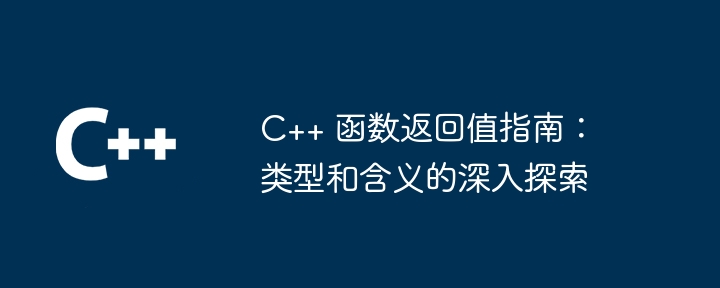
C function return value types include basic types, custom types, pointers, references and void. The meaning of the return value can vary depending on the context and includes operation results, status indications, output parameters, and no return value. Practical cases demonstrate the use of return values in summing and obtaining user names, allowing us to understand the code logic and data flow.

Guide to C Function Return Values: An In-depth Exploration of Types and Meanings
Introduction
The function return value in C is a crucial part of understanding the code logic and data flow. This article will comprehensively explore the types and meanings of C function return values, and deepen understanding through practical cases.
1. Function return value type
C functions can have various return types, including:
2. Meaning of function return value
The meaning of function return value depends on the context in which it is used. It can represent:
3. Practical case
In order to deeply understand the function return value, let’s take a look at a practical case:
int sum(int a, int b) {
return a + b;
}
string get_username() {
// 模拟数据库查询
string username = "John Doe";
return username;
}
int main() {
int result = sum(10, 20); // 储存函数返回值
cout << "Sum: " << result << endl;
string user = get_username(); // 储存函数返回值
cout << "Username: " << user << endl;
return 0;
}at In main function:
sum The function is called, and its return value (30) is stored in the result variable. get_username The function is called and its return value ("John Doe") is stored in the user variable. Conclusion
Through this article, we have an in-depth discussion of C function return value types and meanings. Understanding function return values is critical to understanding code logic and data flow. Through the provided practical examples, we demonstrate how to use function return values effectively.
The above is the detailed content of C++ Function Return Values Guide: A Deep Dive into Types and Meanings. For more information, please follow other related articles on the PHP Chinese website!
 What is the return value of the function
What is the return value of the function
 What are the differences between c++ and c language
What are the differences between c++ and c language
 Recommended learning order for c++ and python
Recommended learning order for c++ and python
 Cost-effectiveness analysis of learning python and c++
Cost-effectiveness analysis of learning python and c++
 Is c language the same as c++?
Is c language the same as c++?
 Which is better to learn first, c language or c++?
Which is better to learn first, c language or c++?
 The difference and connection between c language and c++
The difference and connection between c language and c++
 C++ software Chinese change tutorial
C++ software Chinese change tutorial




